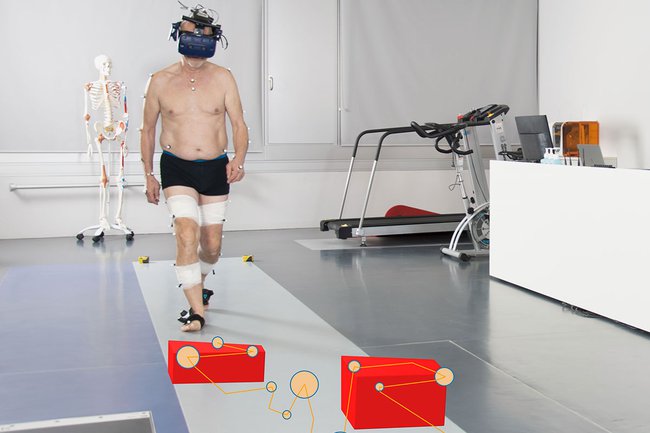New Research for Companies and Healthcare
eXtended Reality and Eye-Tracking in Healthcare and Artificial Intelligence for SMEs

The St. Pölten University of Applied Sciences is launching two new research projects, which are dedicated to the use of eXtended Reality and eye-tracking in healthcare and artificial intelligence in small and medium-sized enterprises.
The projects are funded as part of the “COIN Aufbau” programme. Its aim is to improve the research and technology infrastructures of research institutions and to strengthen their function for companies.
Adaptable eXtended Reality
Immersive eXtended Reality (XR) will advance the most innovative developments in healthcare over the next decade. Two important application areas for XR technologies are cost-effective clinical and paraclinical training, and interactive, virtual environments for patients in therapy and rehabilitation. Digital health applications can also support the trend towards personalised medicine.
“To evolve in this direction, XR environments must become intelligent systems that adapt to users. An objective feedback system based on cognitively and physiologically relevant digital biomarkers provides a basis for this adaptation”, says Vanessa Leung, Senior Researcher at the Center for Digital Health and Social Innovation at the St. Pölten UAS.
Augmented Reality in Emergency Response Training and Fall Prevention
In the EyeQTrack project, Leung is investigating XR technologies in two use cases: error prevention in XR training for paramedics and fall prevention for Parkinson’s disease patients in VR motor rehabilitation.
“EyeQTrack uses advanced image processing, quantitative analysis, and machine learning / artificial intelligence to extract information about cognitive and emotional responses from eye-tracking data streams from commercially available immersive XR technologies. We are building the knowledge base for robust, adaptive XR feedback by deriving insights for training and therapy environments from eye data about users' stress levels, cognitive load, fatigue, and attentional state”, explains Leung.
Establishment of a Network
The project combines several established research and teaching areas at the St. Pölten UAS: Extended Reality, machine learning / artificial intelligence, motor rehabilitation, and nursing and paramedic training. To foster innovation, EyeQTrack connects stakeholders from healthcare and industry as well as an interdisciplinary research team.
The aim of the project is to develop specific use cases, to expand in the medium term through spin-off projects and collaborations, and to build a sustainable ecosystem of expertise, partners, and projects within the next 6 years.
Trustworthy Artificial Intelligence for SMEs
Artificial intelligence (AI) based on machine learning is currently transforming virtually all sectors in the industry and economy. Small and medium-sized enterprises (SMEs) in particular are facing the problem that they are making insufficient use of existing AI solutions and are thus unable to exploit the added value that can be generated with AI.
“The main reasons for this are highly specific analysis requirements of SMEs for which there are no ready-to-use AI solutions, a lack of adaptability of existing AI services to constantly changing requirements, non-transparent decision-making of existing AI, and thus a lack of trust on the part of companies, as well as insufficient amounts of training data for AI”, says Matthias Zeppelzauer, head of the research group Media Computing at the Institute of Creative\Media/Technologies at the St. Pölten UAS and coordinator of the Center for AI at the St. Pölten UAS.
In the project “TrustAI”, he is developing interactively trainable and dynamically adaptable AI services for the highly specific requirements of SMEs that are consistently transparent and therefore trustworthy. “Our key innovation is a new interactive training paradigm in which humans and AI engage in a two-way dialogue and develop a common understanding of problems through mutual explanation. This achieves two goals at the same time: flexible human-driven adaptation of AI to highly specific requirements and inherently self-explanatory AI that acts in a trustworthy manner”, explains Zeppelzauer.
This learning approach enables learning based on small data sets and ensures the transparency of the AI. The goal of the project is, among other things, the implementation of a service platform including graphical interfaces that makes the novel AI approach available to SMEs in a low-threshold way. The benefits of the new approach will be tested in specific case studies in the areas of healthcare, agriculture, and cultural heritage.
Center for Artificial Intelligence
The project is implemented at the new Center for Artificial Intelligence at the St. Pölten UAS and supports the competence development in the two research areas Human-Centered AI and Trustworthy AI.
The solutions developed within the framework of the project will help SMEs to efficiently develop highly specific and at the same time trustworthy AI approaches to increase their competitiveness.
16th Research Forum of the Austrian Universities of Applied Sciences
On 19 and 20 April 2023, the Research Forum of the Austrian Universities of Applied Sciences will take place at the St. Pölten UAS under the motto “Connecting Research”. As part of the event, the Center for Artificial Intelligence of the St. Pölten UAS will be officially launched.
Further links:

Dr. rer. nat. Vanessa Yue Fei Leung
Senior ResearcherCenter for Digital Health and Social Innovation Department of Health Sciences

FH-Prof. Priv.-Doz. Dipl.-Ing. Mag. Dr. Matthias Zeppelzauer
Head ofMedia Computing Research Group
Institute of Creative\Media/Technologies Department of Media and Digital Technologies

Mag. Mark Hammer
Section Head PressMarketing and Communications